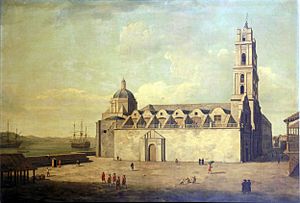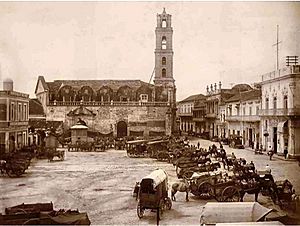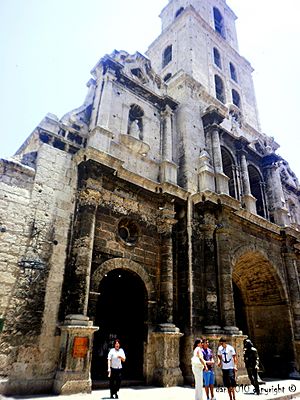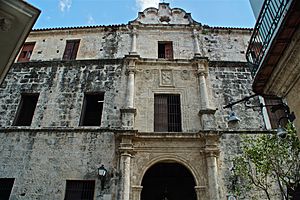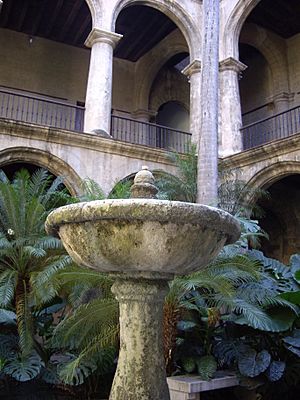Basilica of San Francisco de Asís, Havana facts for kids
Quick facts for kids Basílica Menor de San Francisco de Asís |
|
|---|---|
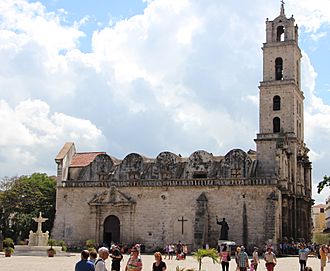
The basilica in 2016
|
|
| General information | |
| Status | Active |
| Type | Catholic church |
| Architectural style | Baroque |
| Town or city | Havana |
| Country | Cuba |
| Coordinates | 23°08′13″N 82°20′54″W / 23.13694°N 82.34833°W |
| Height | 42 metres (138 ft) |
The Basílica Menor de San Francisco de Asís (which means Minor Basilica of Saint Francis of Assisi) is a beautiful old Catholic church and Franciscan convent in Old Havana, Cuba. It's also known as the Convento de San Francisco de Asis.
Building started way back in 1548 and finished in 1591. However, it was first opened in 1575. The church was badly damaged by big storms in 1680 and 1692. A hurricane even knocked down its tower in 1694. The church you see today began to take its current shape in 1716. It was fully completed almost 200 years later, after many repairs and changes from 1731 to 1738.
Contents
Exploring the Plaza de San Francisco de Asís
The Plaza de San Francisco de Asís, or Saint Francis of Assisi Square, is a public square in Old Havana, Havana, Cuba. It was created on June 2, 1628, making it one of Havana's oldest squares. The square is named after the nearby Convento de San Francisco de Asís. This Franciscan convent was built between 1575 and 1591.
In 1836, a famous fountain called the Fuente de los Leones (Fountain of the Lions) was added to the square. It was made by an Italian artist named Giuseppe Gaggini. In 1761, the Mayor of Havana, José Martín Félix de Arrate, thought this was the best square in the city. Back then, the city hall, police station, jail, and customs office all faced this important plaza.
A Painting from 1770
There is a series of 11 paintings by an artist named Dominic Serres. These paintings show the capture of Havana during the Seven Years' War (1756–1763). This war involved Great Britain and Spain. In 1762, British forces planned to attack Spanish lands overseas, including Havana.
A large British fleet of about 180 ships and many soldiers sailed to Cuba. They surprised Havana and captured it. The painting of the Basilica of San Francisco de Asís shows Havana after the British took it over. It highlights the beautiful Baroque style of the church. Even though the painting's title mentions a "cathedral," this building was actually a monastic church from the 1730s.
Serres' painting shows everyday life mixed with signs of conflict. You can see British soldiers exercising in the square. A guard stands by his box, while Spanish Catholic priests walk nearby. Boys are playing, and a European man uses a parasol to block the sun. In the harbor, British warships are anchored.
British Rule and Later Use
The British used the basilica for their religious services during the year they controlled Havana. The Siege of Havana was a military event from March to August 1762. British forces surrounded and captured Havana, which was a key Spanish naval base. This was a big blow to the Spanish Navy.
Havana was later given back to Spain under the 1763 Treaty of Paris, which officially ended the war. When the church returned to Spanish rule, it was no longer used as a place of worship. Today, it is used for concerts and other events.
Next to the basilica is a tall bell tower, which is about 138 feet (42 meters) high. Originally, a statue of St. Francis of Assisi stood on top of the bell tower. However, a cyclone destroyed it in 1846. Now, a statue of Fray Junípero Serra with a Juaneño Indian boy stands near the basilica.
Architecture and Design
The Facade
The front of the church, called the facade, faces Calle Oficios. On the facade, you can see three stone statues. These statues represent the Immaculate Conception, Francis of Assisi, and Saint Dominic. The church became a minor basilica in 1739.
The square next to it, Plaza de San Francisco de Asís, opened in 1628. The basilica and the rest of Old Havana are part of a UNESCO World Heritage Site since 1982. This means they are very important historical and cultural places.
The Cloister and Museum
The cloister is a covered walkway that is part of the monastery next to the church. This part of the building dates back to 1739. Today, the cloister houses a museum of sacred art.
In front of the basilica, on the sidewalk, there is a bronze statue. It is a life-size statue made by Jose Villa Soberon. The statue shows José María López Lledín, who was known as El Caballero de Paris (The Gentleman of Paris). He lived from 1899 to 1985 and is buried inside the basilica.
See also
 In Spanish: Convento de San Francisco de Asís (La Habana) para niños
In Spanish: Convento de San Francisco de Asís (La Habana) para niños
- Plaza Vieja, Havana
- José María López Lledín
- Iglesia del Espíritu Santo, Havana
- Iglesia de San Francisco de Paula, Havana
- Iglesia Santo Cristo del Buen Viaje, Havana
- Havana Cathedral
- List of buildings in Havana
Gallery
 | Madam C. J. Walker |
 | Janet Emerson Bashen |
 | Annie Turnbo Malone |
 | Maggie L. Walker |


